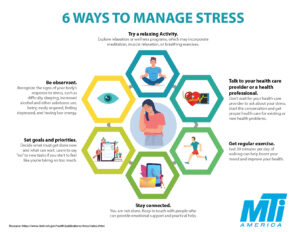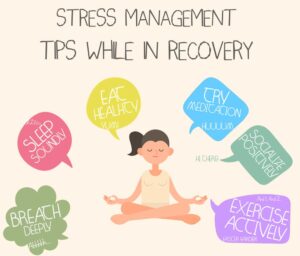Stress is an inevitable part of life, but managing it effectively can lead to a healthier, more balanced lifestyle. Whether it’s work, family, or other responsibilities causing stress, it’s crucial to adopt strategies that help mitigate its impact on your mental health. Here are essential tips to manage stress and maintain mental well-being.
Understanding Stress and Its Effects
What is Stress?
Stress is the body’s reaction to any change that requires an adjustment or response. It can be caused by both positive and negative experiences. While a certain amount of stress is normal and can even be beneficial, excessive stress can harm your health.
Effects of Stress on the Body and Mind
Chronic stress can lead to a variety of health problems, including anxiety, depression, heart disease, and a weakened immune system. It can also affect your cognitive functions, leading to issues with memory, concentration, and decision-making.
Effective Stress Management Techniques
1. Practice Mindfulness and Meditation
Mindfulness and meditation are powerful tools for reducing stress. By focusing on the present moment and practicing deep breathing, you can calm your mind and body. Regular meditation can help reduce symptoms of anxiety and depression, improve concentration, and enhance overall well-being.
How to Get Started with Meditation
- Find a quiet space where you won’t be disturbed.
- Sit comfortably and close your eyes.
- Focus on your breath, observing each inhale and exhale.
- When your mind wanders, gently bring your attention back to your breath.
- Start with a few minutes each day and gradually increase the duration.
2. Maintain a Healthy Lifestyle
Your lifestyle choices play a significant role in managing stress. Incorporate the following habits into your daily routine:
Regular Exercise
Physical activity releases endorphins, which are natural mood lifters. Aim for at least 30 minutes of moderate exercise most days of the week. Activities like walking, jogging, yoga, or dancing can be particularly effective.
Balanced Diet
Eating a balanced diet rich in fruits, vegetables, lean proteins, and whole grains can help stabilize your mood and energy levels. Avoid excessive caffeine, sugar, and processed foods, which can contribute to stress.
Adequate Sleep
Lack of sleep can exacerbate stress. Aim for 7-9 hours of quality sleep each night. Establish a regular sleep schedule, create a calming bedtime routine, and ensure your sleep environment is conducive to rest.
3. Develop Healthy Coping Mechanisms
Time Management
Poor time management can lead to stress. Prioritize tasks, set realistic goals, and break projects into smaller, manageable steps. Use tools like to-do lists and calendars to stay organized.
Set Boundaries
Learn to say no when necessary. Setting boundaries with work, family, and social obligations can help prevent burnout. Communicate your limits clearly and stick to them.
Social Support
Connecting with friends and family can provide emotional support and reduce feelings of isolation. Don’t hesitate to reach out for help when you need it.
4. Practice Relaxation Techniques
Deep Breathing Exercises
Deep breathing can activate your body’s relaxation response. Practice deep breathing exercises, such as inhaling deeply through your nose, holding your breath for a few seconds, and exhaling slowly through your mouth.
Progressive Muscle Relaxation
This technique involves tensing and then slowly relaxing each muscle group in your body. Start from your toes and work your way up to your head, focusing on each muscle group for a few seconds.
5. Seek Professional Help
If stress becomes overwhelming, consider seeking help from a mental health professional. Therapists and counselors can provide strategies and support to help you manage stress effectively.
Conclusion
Managing stress is crucial for maintaining mental health and achieving a balanced life. By incorporating mindfulness, a healthy lifestyle, effective coping mechanisms, relaxation techniques, and seeking professional help when needed, you can significantly reduce stress and improve your overall well-being. Remember, it’s essential to prioritize your mental health and take proactive steps to manage stress in your daily life.


